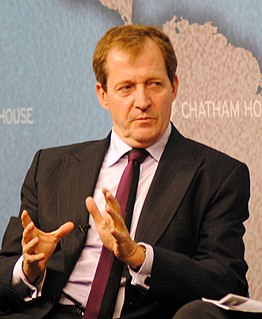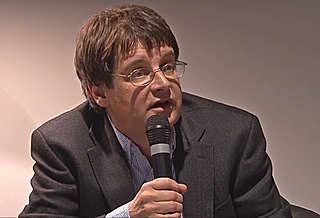A Quote by Murray Rothbard
There is one good thing about Marx: he was not a Keynesian.
Quote Topics
Related Quotes
To paraphrase Karl Marx, the great Karl Marx, a specter is haunting the streets of Copenhagen...Capitalism is the specter, almost nobody wants to mention it...Socialism, the other specter Karl Marx spoke about, which walks here too, rather it is like a counter-specter. Socialism, this is the direction, this is the path to save the planet, I don't have the least doubt. Capitalism is the road to hell, to the destruction of the world.
Mr. Speaker, in 1848, Karl Marx said, a progressive income tax is needed to transfer wealth and power to the state. Thus, Marx's Communist Manifesto had as its major economic tenet a progressive income tax. Think about it, 1848 Karl Marx, Communism.... I say it is time to replace the progressive income tax with a national retail sales tax, and it is time to abolish the IRS, my colleagues. I yield back all the rules, regulations, fear, and intimidation of our current system.
My closest friend, who died not long ago, is buried near Marx's grave in Highgate cemetery, so I see the gaggle of admirers laying roses at the foot of his tombstone regularly. I have never been tempted to leave flowers there myself. Great theories, shame about the practice. Marx did many things. But inventing class was not one of them.
There's a sense in which Marx does contribute to the fund of human knowledge, and we can no more dismiss him than we can [George] Hegel or [Jean-Jacques] Rousseau or [Baruch] Spinoza or [Charles] Darwin; you don't have to be a Darwinian to appreciate Darwin's views, and I don't have to be a Marxist to appreciate what is valid in a number of [Karl] Marx's writings-and Marx would call that a form of simple commodity production rather than capitalism.
The moralist and the revolutionary are constantly undermining one another. Marx exploded a hundred tons of dynamite beneath the moralist position, and we are still living in the echo of that tremendous crash. But already, somewhere or other, the sappers are at work and fresh dynamite is being tamped in place to blow Marx at the moon. Then Marx, or somebody like him, will come back with yet more dynamite, and so the process continues, to an end we cannot foresee.
The two most far-reaching critical theories at the beginning of the latest phase of industrial society were those of Marx and Freud. Marx showed the moving powers and the conflicts in the social-historical process. Freud aimed at the critical uncovering of the inner conflicts. Both worked for the liberation of man, even though Marx's concept was more comprehensive and less time-bound than Freud's.
Most of Marx's predictions have failed to materialize, and his labor theory of value and other ideas have been proven wrong. Marx failed to recognize the incentive system built into the capitalist model - consumer choice and the profit motive of the entrepreneur. The irony is that capitalism, not socialism or Marxism, that has liberated the worker from the chains of poverty, monopoly, war, and oppression, and has better achieved Marx's vision of a millennium of hope, peace, abundance, leisure, and aesthetic expression for the 'full' human being.
In the last few decades we have seen the extraordinary rise of ecosocialist movements around the world inspired in large part by Marx's ecological critique of political economy. Marx was indeed influenced by some of the earliest attempts to develop what we now call an ecological-systems view, rooted in the concept of metabolism. Building on this perspective, Marx defined socialism as the rational regulation by the associated producers of the metabolism between society and nature in such a way as to conserve energy and to promote the satisfaction of human needs.



































